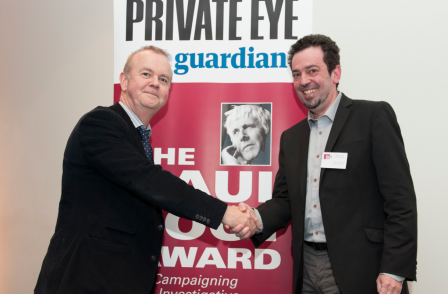
The Evening Standard’s David Cohen picked up the Paul Foot Award for campaigning and investigative journalism last night for his investigation into gangs as part of the Frontline London campaign.
Cohen won the £5,000 prize beating competition which included The Guardian for its Snowden Files investigation into government surveillance.
The Guardian team of James Ball, Julian Borger, Nick Davies, Nick Hopkins, Paul Johnson, Ewen MacAskill and Alan Rusbridger was instead awarded a £2,000 special investigation award.
The Paul Foot Awards judges were: Ian Hislop, Bill Hagerty, Brian MacArthur and Simon Jenkins. The Paul Foot Award is jointly organised by The Guardian and Private Eye.
Private Eye editor Ian Hislop said: “The results of the Paul Foot Award are a closely kept secret. Unless you work in GCHQ when you presumably have known for weeks.
“However what is not a secret is how impressive the entries are this year, how resilient investigative journalism is proving to be and how optimistic this made the judges feel.
“We tried to reflect the impressive range in subject matter by recognising the coverage of both global and local issues, by honouring stories that involved President Obama as well as those that involved youngsters in London, by giving a prize to a whole newspaper as well as one to an extraordinary single journalist.”
What the judges said about the winners:
Frontline London, the Evening Standard
David Cohen’s campaign this year was his toughest yet, as he sought to access London’s violent criminal gangs. The campaign took five months to plan and saw Cohen having to win the trust of gang members, and even help a few of them exit “the roads” via social enterprises supported by small grants from the Evening Standard’s Dispossessed Fund. Cohen struck a fine balance between humanising those he met – a chaotic, hardcore group of young people – without ignoring what they had become.
The campaign had a remarkable degree of success and became truly interactive, as Cohen sought to deliver a hard hitting investigation, as well as champion social change. Following his campaign, three social enterprises have launched, run by former criminal gang members who demonstrated a desire to turn their lives around.
The campaign also jump-started politicians to act. Government Minister Nick Hurd agreed to release £3.8 million of government money to help address the problem, and Mayor Boris Johnson has appointed a Gang’s Czar and begun to organise a Gangs Roundtable and Gangs Summit.
The Snowden Files, The Guardian
This investigation, taken from the Edward Snowden leaks, revealed for the first time the extent of mass surveillance undertaken by GCHQ, and the remarkably close relationship the agency has with its US equivalent, the National Security Agency. The Guardian revealed the National Security Agency funded some of GCHQ’s activities to secure access to, and influence over, Britain’s intelligence gathering programmes.
A team of six spent a number of weeks on a campaign that was exhaustively checked to ensure that it did not threaten our national security. The Guardian revealed how GCHQ covertly gained access to the network of cables which carry the world’s telephone calls and internet traffic, all without any form of public acknowledgement or debate. This became one of the biggest stories of the decade, sparking an emergency debate and several other set-piece debates in Parliament around the legal and supervisory framework under which GCHQ operates. The story also had international ramifications – even Barack Obama was forced to respond.
The other finalists, each receiving £1,000, were:
- Tom Bergin, Reuters – Corporate tax practices
- Jonathan Calvert and Heidi Blake, Sunday Times – Westminster for Sale
- Aasma Day, Lancashire Evening Post – Life on the margins of society: Preston Twilight Investigation
- James Dean, The Times – Fakes, fraud and forgery in Lloyds selling scandal.
Email pged@pressgazette.co.uk to point out mistakes, provide story tips or send in a letter for publication on our "Letters Page" blog
